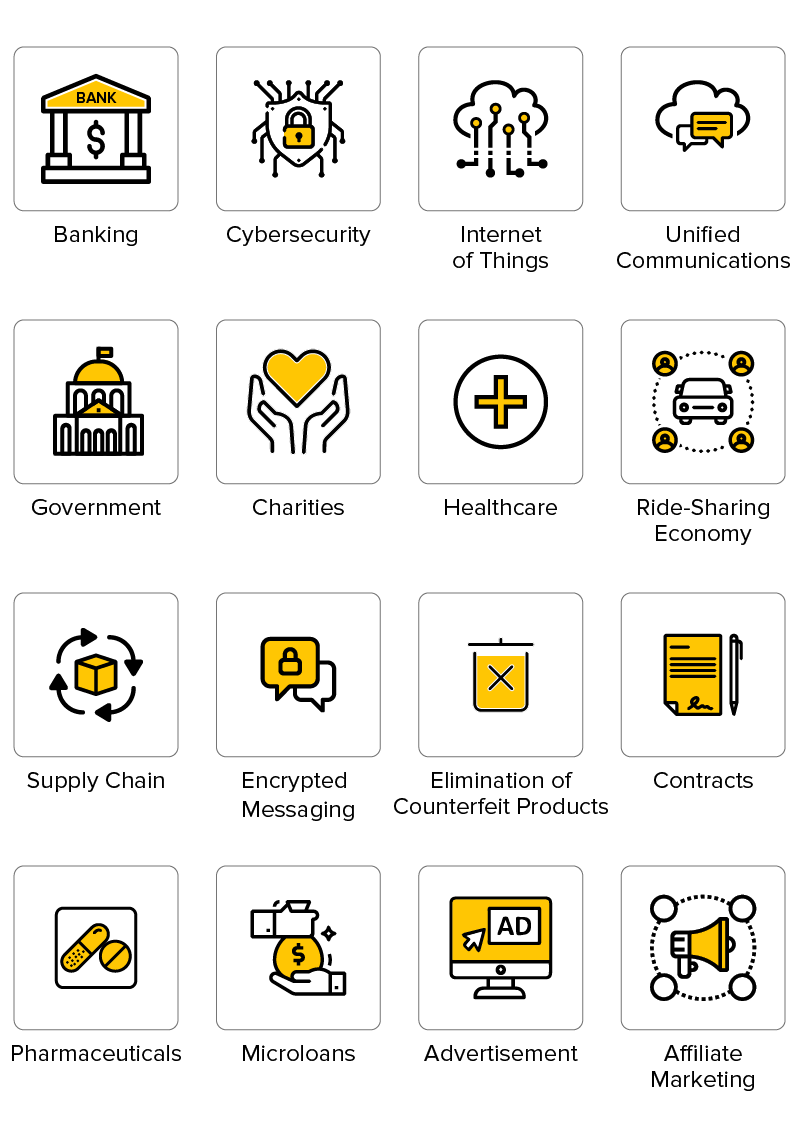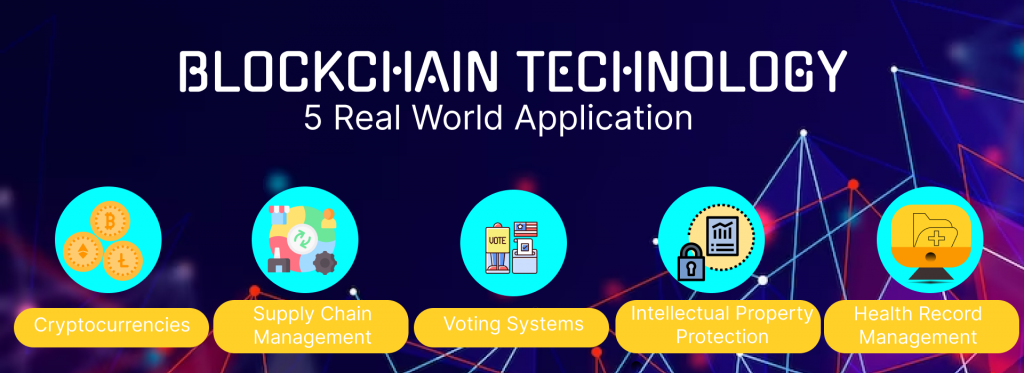Introduction: Blockchain Technology Beyond Cryptocurrency
When people think of blockchain technology, the first thing that often comes to mind is cryptocurrency—specifically Bitcoin. However, blockchain technology is far more than just the backbone of digital currencies. Over the last decade, this innovative technology has expanded its reach into various industries, offering transformative potential far beyond the realm of finance. Blockchain’s ability to provide secure, decentralized, and transparent systems has made it an attractive solution for sectors like healthcare, supply chain management, voting systems, and even intellectual property.

1. Blockchain in Healthcare: Securing Patient Data
One of the most promising uses of blockchain technology is in healthcare. With the growing amount of sensitive medical data being generated, ensuring privacy and security is paramount. Blockchain allows healthcare providers to store patient data in a decentralized ledger that is both transparent and secure, reducing the risks of data breaches. Additionally, it enables seamless sharing of medical information between different healthcare providers, improving patient care and reducing administrative inefficiencies.
2. Revolutionizing Supply Chain Management with Blockchain
In supply chain management, blockchain technology provides a robust framework for ensuring transparency and accountability throughout the entire process. By recording every transaction in an immutable ledger, blockchain enables businesses to trace products from their origin to their final destination. This transparency not only helps prevent fraud but also enhances efficiency by allowing companies to quickly identify bottlenecks and optimize their supply chains. For industries like food safety, this could mean the difference between identifying a contamination source in hours instead of days.

3. Blockchain for Digital Identity and Privacy
With increasing concerns about data privacy and identity theft, blockchain technology has emerged as a solution to protect and manage digital identities. Through blockchain, individuals can control access to their personal information, ensuring that only authorized parties can view or use it. This could greatly reduce the incidence of data breaches, online fraud, and identity theft, giving users more control over their digital presence.
4. Blockchain in Voting Systems: Ensuring Fair Elections
Blockchain technology can also be applied to create secure, transparent voting systems. By using blockchain, voting data can be securely stored, preventing tampering or fraud. Each vote is recorded on a decentralized ledger, making it nearly impossible to alter results after they’ve been cast. This ensures the integrity of elections and increases public trust in democratic processes. Blockchain-based voting systems could also make elections more accessible, allowing people to vote remotely without sacrificing security.

5. Intellectual Property and Copyright Protection with Blockchain
For creators and artists, blockchain technology offers an innovative solution to protect intellectual property (IP). Blockchain can help securely track the ownership and usage rights of creative works, providing a transparent and verifiable record of ownership. By recording IP rights on a blockchain, creators can protect their work from unauthorized use and easily prove ownership if a dispute arises. This technology has the potential to disrupt industries like music, art, and film, where piracy and unauthorized distribution are ongoing concerns.
6. Decentralized Finance (DeFi) and Blockchain’s Impact on Traditional Banking
Though often associated with cryptocurrency, blockchain technology is the driving force behind Decentralized Finance (DeFi). This system seeks to recreate traditional financial services, such as lending, borrowing, and trading, on a decentralized blockchain. By removing intermediaries like banks and brokers, DeFi platforms offer users lower fees, greater access, and increased financial inclusivity. Blockchain technology is democratizing finance, allowing anyone with an internet connection to participate in the global economy.
7. Smart Contracts: Automating Agreements with Blockchain
Another ground breaking application of blockchain technology is in the use of smart contracts. These are self-executing contracts where the terms of the agreement are directly written into code. Smart contracts automate the execution of an agreement when predefined conditions are met, reducing the need for intermediaries. This not only speeds up processes but also cuts costs and enhances security. Industries such as real estate, insurance, and legal services can significantly benefit from the efficiency and reliability of smart contracts.

8. Blockchain in Real Estate: Streamlining Property Transactions
In the real estate industry, blockchain technology can streamline the buying and selling process by reducing paperwork, eliminating fraud, and ensuring a transparent record of ownership. Smart contracts can automate property transactions, ensuring that all parties fulfill their obligations before a transfer of ownership occurs. This reduces the time and cost associated with property transactions, making the process more efficient and secure for both buyers and sellers.
The Future of Blockchain Technology: Challenges and Opportunities
While the potential applications of blockchain technology are vast, there are still challenges to overcome. Scalability, energy consumption, and regulatory concerns are among the key hurdles that need to be addressed for blockchain to achieve its full potential. However, as technology advances and solutions are developed, blockchain will continue to disrupt industries across the globe.
Conclusion: Blockchain’s Transformative Potential Beyond Cryptocurrency
In conclusion, blockchain technology is much more than the foundation for cryptocurrency. Its decentralized, secure, and transparent nature makes it an ideal solution for various industries looking to innovate and streamline operations. From healthcare and supply chain management to voting systems and intellectual property protection, blockchain’s potential to transform the world is vast. As we continue to explore its possibilities, blockchain is set to become a cornerstone of the digital future, empowering businesses and individuals alike to navigate a more secure, efficient, and transparent world.
For more information, please visit


